 Petzlover
Petzlover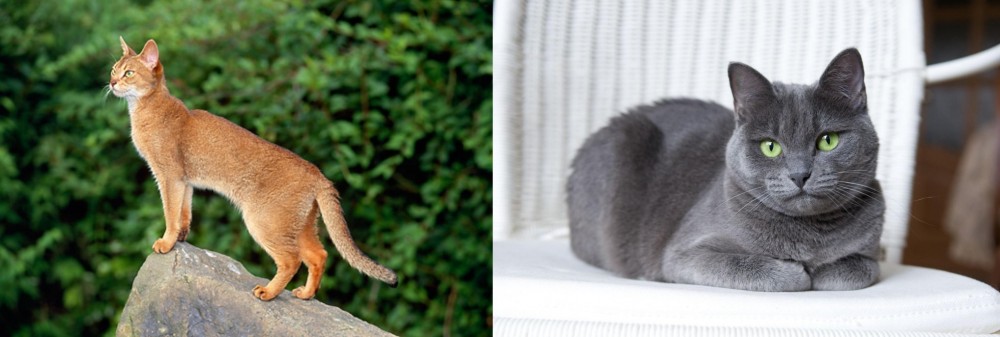 Abyssinian is originated from Ethiopia but Russian Blue is originated from Russia. Both Abyssinian and Russian Blue are having almost same weight. Abyssinian may live 7 years less than Russian Blue. Both Abyssinian and Russian Blue has same litter size. Both Abyssinian and Russian Blue requires Low Maintenance.
Abyssinian is originated from Ethiopia but Russian Blue is originated from Russia. Both Abyssinian and Russian Blue are having almost same weight. Abyssinian may live 7 years less than Russian Blue. Both Abyssinian and Russian Blue has same litter size. Both Abyssinian and Russian Blue requires Low Maintenance.
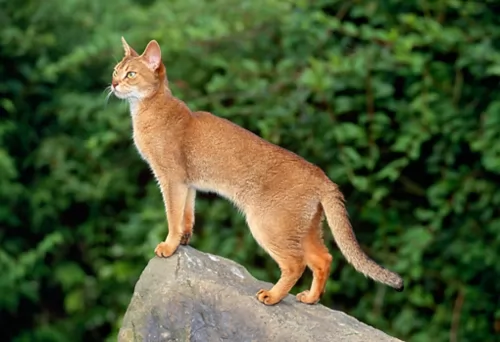 Known also as the Bunny Cat or the Abys, the Abyssinian cat hails from Abyssinia which is today known as Ethiopia.
Known also as the Bunny Cat or the Abys, the Abyssinian cat hails from Abyssinia which is today known as Ethiopia.
It is believed that the cat was brought to the UK in the 1860s. At first the cat was crossed with British Shorthairs, and later with oriental breeds.
The cat was imported in 1900 to America with some breeding programs starting in the United States in the 1930s. It is thought that it was a good thing that cats were exported to the U.S. because World War II took a toll on breed numbers but the breed was built up again in the USA.
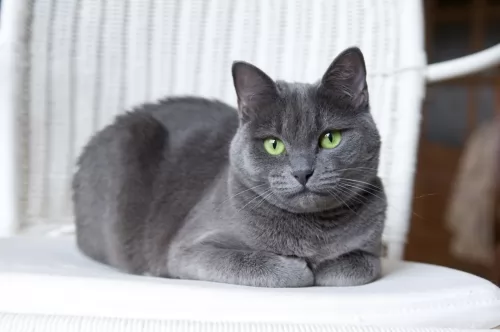 It is believed that this beautiful cat originates from Russia, and more specifically the Archangel Isles.
It is believed that this beautiful cat originates from Russia, and more specifically the Archangel Isles.
It is also thought that these cats descended from cats that were kept by the Russian Czars and that they arrived in England and Northern Europe during the 1860s. It appeared in cat shows and by 1912 it was given its own classification.
The cat was also introduced to the United States in the early 1900s and today it is a popular domesticated pet.
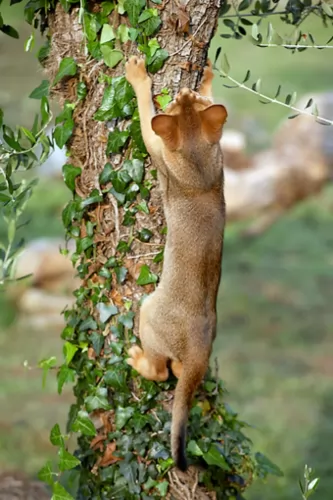 The Abyssinian is a slender, lithe, fine-boned, medium sized cat with shortish to medium length silky hair and long, slender legs.
The Abyssinian is a slender, lithe, fine-boned, medium sized cat with shortish to medium length silky hair and long, slender legs.
The fur has a distinctive ticked look. The coat comes in several colors – but its base color is a glossy reddish-brown base with black ticking.
You’ll find that the feline reaches a height of 20-25 cm and that its length is roughly 30-41 cm. When your Abyssinian is an adult it will weigh about 4-5 kg. With good care, your feline pet can reach up to 13 years of age.
The kittens are born with dark coats, but as they mature, the coat lightens. The head of the cat is somewhat wedge-shaped and it has fairly large ears with big almond-shaped eyes. The eyes can be green or hazel, depending on the coat shade. The tail is long and tapering.
The Abyssinian loves leaping onto cupboard tops or anything that has some height. It's an intelligent cat this Aby and always on the go. He is a playful cat and just loves being the center of attention, and when he has lots of toys he is always occupied, entertaining you with his antics.
If you were to be away at work every day, it would be a good idea to have a friend for him because he’s the kind of cat that becomes bored and lonely and then he becomes naughty. This cat is known as a clown with its outgoing, mischievous nature.
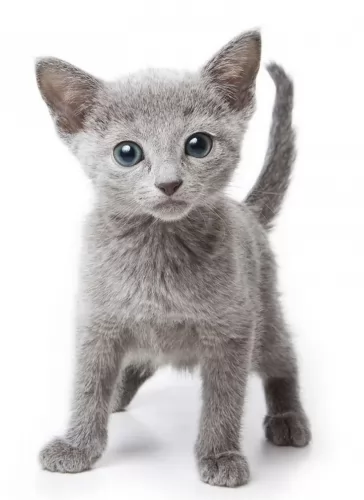 The medium-sized Russian blue cat is slender, strong, and muscular with long legs. He can weigh between 3 and 6kg.
The medium-sized Russian blue cat is slender, strong, and muscular with long legs. He can weigh between 3 and 6kg.
He has a beautiful blue, soft double coat that is short and thick. The coat is an even color with silver tips. What is an attractive feature of this cat too is that his double coat doesn’t shed much. The cat has a triangular-shaped head with yellow to green eyes.
The Russian Blue is such an amicable, sweet-tempered cat that likes nothing more than to be in the company of his human owners, He is calm and independent. They do well living with their human families but they do tend to form a deep bond with that one special person.
He will even follow his owner everywhere and is a loving, loyal companion. The Russian Blue is a social cat but also enjoys some quiet time out just to chill. He also isn’t too fond of visitors and may run away and hide if the occasion becomes too large and noisy.
This is a cat that will miss you when you’re at work all day but he is able to quietly wait for your arrival back home. Then he will appreciate some playtime.
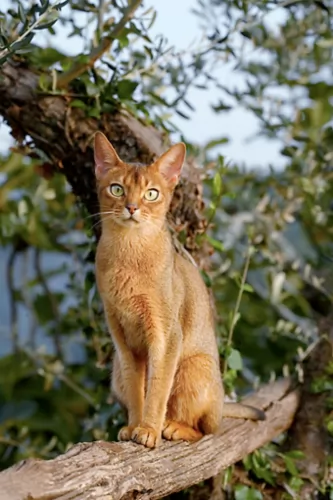 Your active Abyssinian cat is such a pleasure to have in the home as these cats love their human family as well as other pets in the home.
Your active Abyssinian cat is such a pleasure to have in the home as these cats love their human family as well as other pets in the home.
He’ll talk to you in a quiet way. They’re playful cats and you want to make sure you supply him with some stimulating toys.
Remember to brush his coat gently and make it a special therapeutic, bonding time. Make sure your active cat has exercise and provide some climbing equipment for him. Most of all he just wants to be around you and to get your loving attention.
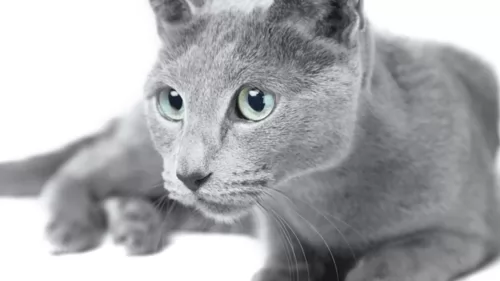 Your Russian Blue is such an intelligent cat and for this reason, when you bring one into your home, you’ll need to provide him with lots of stimulating toys and fun play times.
Your Russian Blue is such an intelligent cat and for this reason, when you bring one into your home, you’ll need to provide him with lots of stimulating toys and fun play times.
This is also a low maintenance cat and a brush once a week will be all that is required.
These are cats that love their mealtimes and you’ll want to work out a special eating program to ensure he gets all the nutrition he needs without over-eating.
Respond with lots of love and attention to your vocal Russian Blue, and you’ll soon see what a precious jewel this cat is as a companion and friend.
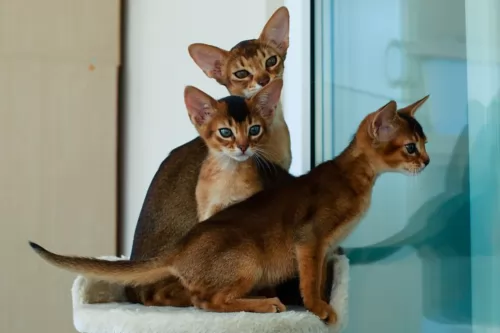 The Abyssinian has been known to be prone to kidney disorders. It can also be prone to gingivitis which can lead to periodontal disease.
The Abyssinian has been known to be prone to kidney disorders. It can also be prone to gingivitis which can lead to periodontal disease.
Also, the Abyssinian has been known to have problems with blindness. An eye problem, called progressive retinal atrophy is where the cells deteriorate over time and this is what causes the blindness.
The Abyssinian can also be prone to patellar luxation where the kneecap can become dislocated.
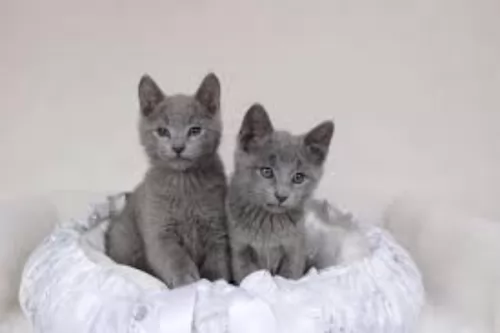 Because the Russian Blue is a naturally occurring breed, they are fairly healthy cats. Watch out for obesity and urinary tract infections with your cat.
Because the Russian Blue is a naturally occurring breed, they are fairly healthy cats. Watch out for obesity and urinary tract infections with your cat.
Obesity shortens a cat’s life. It puts extra pressure on the cat’s joints and it makes them more likely to develop disease. Then again, it is dangerous to suddenly put your obese cat on a strict diet so that he loses weight too quickly.
Your cat requires a gradual decrease in body weight. If you’re worried about your cat’s weight, rather speak to a veterinary surgeon who can explain to you and also draw up a weight loss program for your cat.
Remember too, that cats are carnivores and they simply have to have meat in their diet. Commercially manufactured cat foods of the highest quality are high in protein and low in carbohydrates.
Feline lower urinary tract disease is no joke for a cat. This disease affects your pet’s lower urinary tract – the bladder. Causes include bladder stones or bladder infections and inflammation in the urinary bladder.
You may notice your cat battling to urinate. Your cat will also no doubt cry out while trying to urinate and this is because the process is so painful. There may also be blood in the urine.
You may notice that your cat isn’t using his litter box but urinating elsewhere. Your cat will need to get to the vet as soon as possible. It may not be a life-threatening disease but it can be highly uncomfortable for your cat.
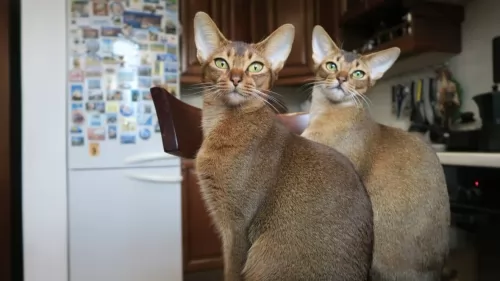 The Abyssinian cat’s short, fine coat is easy to care for. Brush and comb it timeously to remove loose hairs.
The Abyssinian cat’s short, fine coat is easy to care for. Brush and comb it timeously to remove loose hairs.
Because of periodontal disease, brush your cat's teeth. If you feel you don’t know how to perform any of these ‘caring’ routines for your kitty kat, don’t despair as your vet can do a dental cleaning procedure as well as your pet groomers.
Your Abyssinian cat is carnivorous and will need food similar to that which they would prey on in the wild. Your cat will require foods high in protein and with added vitamins and minerals.
Avoid cat foods that add in useless fillers such as wheat and soy. It is important that you buy the right cat food for your Abyssinian, and if you’re in any doubt, speak to your vet. Make sure your cat always has access to a bowl of fresh, cool water.
Always keep your Abyssinian’s litter box spotlessly clean. You can keep a special little plastic rake to rake up the sand and rid the box of cat droppings immediately.
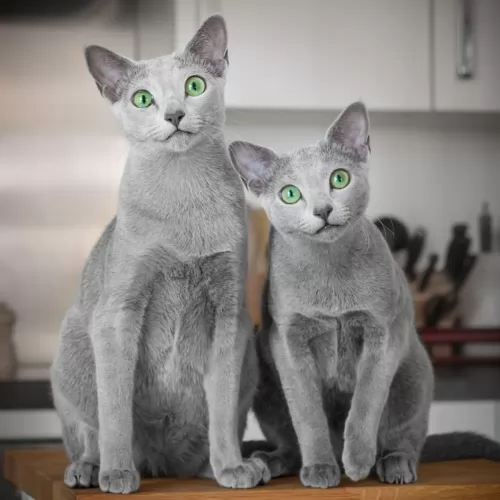 The Russian Blue’s beautiful blue coat is short and thick and will do well with a brush once a week. The cat just thrives on the attention during brush time too.
The Russian Blue’s beautiful blue coat is short and thick and will do well with a brush once a week. The cat just thrives on the attention during brush time too.
Trim your Russian blue’s nails regularly.
Provide your cat with everything he needs to make his life pleasant. Food and water bowls, a litter box, a collar and tag, a nice soft bed, grooming accessories, climbing tree, and a scratching post.
Make sure he has his cat vaccines and is treated for parasites.